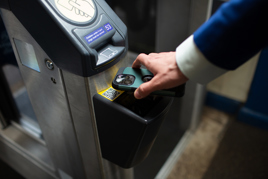Regulated rail fares in England are to rise by 4.6% next year, with railcard costs also set to go up.
The government’s full Autumn Budget document confirmed the increases, although they were not mentioned by Rachel Reeves - who confirmed another freeze in fuel duty and maintaining the existing 5p cut for another 12 months - at the despatch box.
The Department for Transport is set to be given a £30 billion settlement for 2025-26, which will “support the government’s ambition to improve the performance and reliability of rail services”.
The government said: “Since the pandemic, the government subsidy for passenger services has increased to meet a shortfall in revenue as travel patterns have changed, in addition to the funding it provides to operate and maintain the rail network. The government will look to recover this shortfall to support services and ensure the railway is able to operate effectively.
“The government confirms that the annual regulated rail fares cap will rise by 4.6% on 2 March 2025, one percentage point above RPI. This will be the lowest absolute increase in three years.
“Subject to an industry proposal, the government will also agree a £5 increase to the price of most rail cards (except the disabled person’s rail card).
“These policies will support the Secretary of State for Transport’s plans for reform, which will increase efficiency and reduce costs, while boosting ridership and revenue and improving performance, laying the groundwork for the transition to Great British Railways.
“The government also recognises the value that rail manufacturing brings to the UK and is in the early stages of agreeing a rolling stock strategy that will bring stability to the sector.”
About 45% of fares on Britain's railways are regulated by the Westminster, Scottish and Welsh Governments.
They include season tickets on most commuter journeys, some off-peak return tickets on long-distance routes, and flexible tickets for travel around major cities.
Reacting to the news, Andy Bagnall, Chief Executive of Rail Partners, said: "Government should set fares at a level that will ultimately encourage more people to travel by train in the future, helping to secure the long-term financial sustainability of the sector and capture the wider economic and environmental benefits of rail for the nation as a whole. The focus must be on growing passenger numbers, not making current passengers pay more."















Login to comment
Comments
No comments have been made yet.